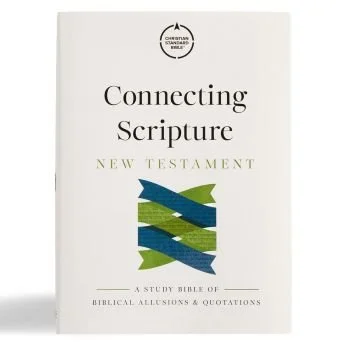Some Important Books on the Horizon — Get That Credit Card Out!
I know, I know, we often hear that a particular book is “must reading.” But there are times when a new book really is something well worth owning and carefully reading. There are three such books soon to be released, which I really do think are important and valuable. I have listed them in order of publication date.
First on the list is Connecting Scripture which has just been released by Holman. Connecting Scripture is a CSV (Christian Standard Version) New Testament which does something no other New Testament does. The biblical text has blue and green color coding to indicate when a biblical saying is either a direct citation from the New Testament (blue) or an allusion to something in the Old Testament (green). This enables the reader to see where a New Testament writer quotes from or draws allusion to something in the Old Testament—the thought world of New Testament writers.
This New Testament also has extensive and very helpful notes explaining where and why a New Testament passage is best understood in light of the Old Testament background and context, even in those cases where there is not a direct quotation or immediately identifiable allusion. At a glace, the user of Connecting Scripture can see where and why use is made in the New Testament of the Old Testament—making it an invaluable and helpful resource.
I just got my copy and find myself thumbing through it despite having other things to do.
Dr. Scott Clark—a friend and colleague—has been working on this project nearly as long as I have known him: an historical, theological, and pastoral commentary on The Heidelberg Catechism. We have seen a fair bit of this material previewed on Scott’s Heidelblog over the years, but to have it assembled in a one volume commentary makes it an invaluable reference and accessible resource for anyone interested in the Reformed Confessions.
The need for a comprehensive and modern commentary on the beloved Heidelberg Catechism is obvious. There have been many previous efforts, to be sure, but Clark’s commentary treats the catechism in its historical context, and reflects Ursinus’s efforts to engage with long-standing and contemporary theological debate and conflict, while keeping the pastoral focus of the Catechism through consistently reminding us of our only comfort in life and in death (Q & A 1 of the Catechism).
This volume will long be the gold standard for comment upon the Catechism.
This is the second of a three volume historical and cultural analysis seeking to answer the question we all must ask, if we are to understand the age in which we live. Why do moderns seek to be “spiritual but not religious”? Mike Horton’s Magician and Mechanic continues to unpack the re-awakened ancient focus upon the “divine self.” Volume two surveys the historical ground from the Enlightenment up to the Scientific Revolution.
Admittedly, the first volume in the series, Shaman and Sage was a difficult read if only because my own knowledge of the Axial Age (8th century BCE - the 3rd century BCE) was so thin (Business Admin majors at Cal-State Fullerton didn’t learn much about the Axial Age). Yet, as I read through Horton’s discussion of the ancient world—looking up the names and key movements as I went—it was quite an eye-opener to connect the dots and see how deeply the modern “spiritual” age draws upon and reflects the Axial Age (without moderns even realizing the connection to it in most cases). In this second volume, Horton describes the decline of the influence of ancient magic and orthodox religion in the face of the Enlightenment and the rise of modern science. This period reflects a quest for the sacred and meaning in life, but does not succeed and ironically continues to prepare the West to look for answers in a “divine self,” and not in revealed religion grounded in redemptive-history.
Horton’s series “Quest for the Divine Self” is both fascinating and encouraging. Looking within for answers is an abject failure—even though it characterizes much of modern life. Looking outside to a crucified and risen Savior is critical to escape the “subjective turn” toward the spiritual and away from the Creator-Redeemer.
Magician and Mechanic will be well worth the careful effort required to trace the influence of the quest for the “divine self” has upon the world around us. A brilliant analysis!


